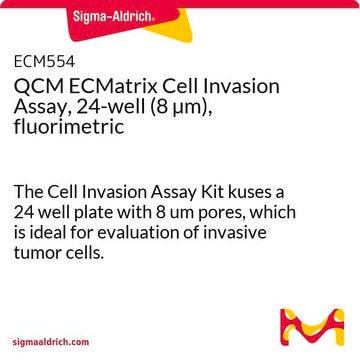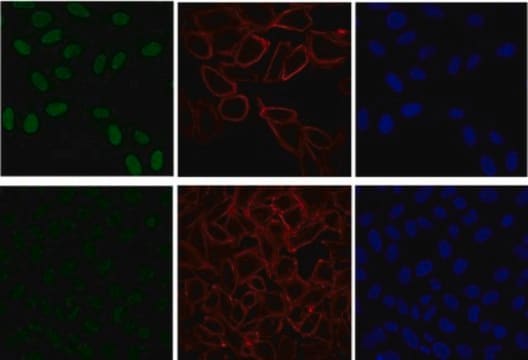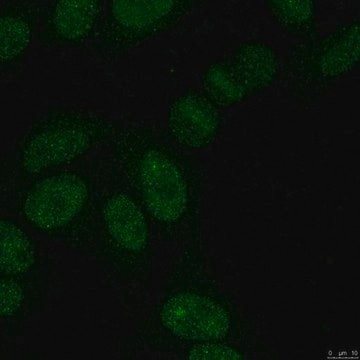推荐产品
生物源
rabbit
品質等級
抗體表格
affinity isolated antibody
抗體產品種類
primary antibodies
無性繁殖
polyclonal
純化經由
affinity chromatography
物種活性
rat, human, mouse
物種活性(以同源性預測)
orangutan
技術
immunocytochemistry: suitable
western blot: suitable
NCBI登錄號
UniProt登錄號
運輸包裝
wet ice
目標翻譯後修改
unmodified
基因資訊
human ... TMEM201(199953)
一般說明
Transmembrane protein 201, also known as NET5, is a transmembrane protein of the nuclear envelope that is homologous to spindle-associated membrane protein 1 (SAMP1) in humans. NET5 is thought to be expressed on the inner nuclear membrane during interphase and move to the polar regions of the mitotic spindle during mitosis.
免疫原
KLH-conjugated linear peptide corresponding to human NET5.
應用
Research Category
Epigenetics & Nuclear Function
Epigenetics & Nuclear Function
Research Sub Category
Cell Cycle, DNA Replication & Repair
Cell Cycle, DNA Replication & Repair
Use Anti-NET5 Antibody (Rabbit Polyclonal Antibody) validated in WB, ICC to detect NET5 also known as transmembrane protein 201.
Western Blot Analysis: 1 µg/mL from a representative lot detected NET5 on 10 µg of rat heart tissue lysate.
Immunocytochemistry Analysis: A representative lot was used by an independent laboratory that detected NET5 in U2OS cells expressing various NET-GFP fusions. (Wilkie, G., et al. (2011) Mol. Cell Proteomics).
Immunocytochemistry Analysis: A representative lot was used by an independent laboratory that detected NET5 in U2OS cells expressing various NET-GFP fusions. (Wilkie, G., et al. (2011) Mol. Cell Proteomics).
品質
Evaluated by Western Blot in human heart tissue lysate.
Western Blot Analysis: 1 µg/mL of this antibody detected NET5 on 10 µg of human heart tissue lysate.
Western Blot Analysis: 1 µg/mL of this antibody detected NET5 on 10 µg of human heart tissue lysate.
標靶描述
~72 and/or 43 kDa observed depending on lysate used. Isoform1: 72 kDa and Isoform 2: 43 kDa Uncharacterized band at ~28 kDa may be observed in some lysates.
外觀
Affinity purified
Purified rabbit polyclonal containing 0.1 M Tris-Glycine (pH 7.4), 150 mM NaCl with 0.05% sodium azide.
儲存和穩定性
Stable for 1 year at 2-8°C from date of receipt.
分析報告
Control
Human heart tissue lysate
Human heart tissue lysate
其他說明
Concentration: Please refer to the Certificate of Analysis for the lot-specific concentration.
免責聲明
Unless otherwise stated in our catalog or other company documentation accompanying the product(s), our products are intended for research use only and are not to be used for any other purpose, which includes but is not limited to, unauthorized commercial uses, in vitro diagnostic uses, ex vivo or in vivo therapeutic uses or any type of consumption or application to humans or animals.
未找到合适的产品?
试试我们的产品选型工具.
儲存類別代碼
12 - Non Combustible Liquids
水污染物質分類(WGK)
WGK 1
閃點(°F)
Not applicable
閃點(°C)
Not applicable
Anne T Bertrand et al.
Cells, 9(4) (2020-04-05)
LMNA encodes for Lamin A/C, type V intermediate filaments that polymerize under the inner nuclear membrane to form the nuclear lamina. A small fraction of Lamin A/C, less polymerized, is also found in the nucleoplasm. Lamin A/C functions include roles
Nikolaj Zuleger et al.
Genome biology, 14(2), R14-R14 (2013-02-19)
Different cell types have distinctive patterns of chromosome positioning in the nucleus. Although ectopic affinity-tethering of specific loci can be used to relocate chromosomes to the nuclear periphery, endogenous nuclear envelope proteins that control such a mechanism in mammalian cells
Phu Le Thanh et al.
Neuromuscular disorders : NMD, 27(4), 338-351 (2017-02-19)
Reports of aberrant distribution for some nuclear envelope proteins in cells expressing a few Emery-Dreifuss muscular dystrophy mutations raised the possibility that such protein redistribution could underlie pathology and/or be diagnostic. However, this disorder is linked to 8 different genes
Nadia Korfali et al.
Nucleus (Austin, Tex.), 3(6), 552-564 (2012-09-20)
One hypothesis to explain how mutations in the same nuclear envelope proteins yield pathologies focused in distinct tissues is that as yet unidentified tissue-specific partners mediate the disease pathologies. The nuclear envelope proteome was recently determined from leukocytes and muscle.
Gavin S Wilkie et al.
Molecular & cellular proteomics : MCP, 10(1), M110-M110 (2010-09-30)
Nuclear envelopes from liver and a neuroblastoma cell line have previously been analyzed by proteomics; however, most diseases associated with the nuclear envelope affect muscle. To determine whether muscle has unique nuclear envelope proteins, rat skeletal muscle nuclear envelopes were
我们的科学家团队拥有各种研究领域经验,包括生命科学、材料科学、化学合成、色谱、分析及许多其他领域.
联系技术服务部门








